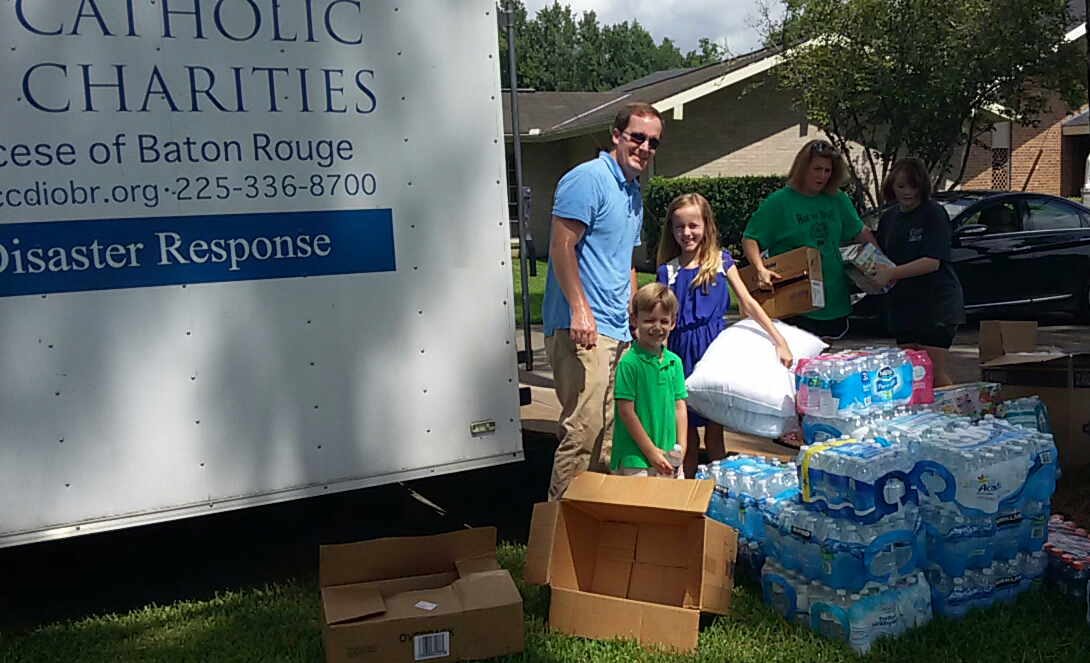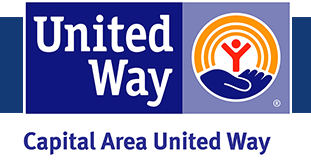
Baton Rouge—After any disaster, the phones at Catholic Charities of the Diocese of Baton Rouge (CCDBR) start ringing. The staff at the agency brace for the calls from people wanting to help as news of the destruction unfolds.
“We aren’t surprised that people in Louisiana want to help” said David Aguillard, CCDBR Executive Director. “The people of South Louisiana are traditionally known for being some of the most generous in the country. Since the outpouring of support for the state after Hurricane Katrina, that tradition grew even stronger.”
CCDBR is no stranger to disasters either. In the past 15 years, the agency rose to become the area’s leading disaster response and long-term recovery agencies. Immediately following a disaster, the agency mobilizes teams of volunteers and supplies into the hardest hit areas. When the focus switches to recovery, CCDBR case managers work with survivors to development family recovery plans covering a myriad of needs—housing, jobs, mental health counseling, and more.
“Catholic Charities is known for rolling up our sleeves, testing lessons learned from past disasters and buckling down for the hard work of helping people to rebuild their lives,” said Aguillard.
“It’s heartwarming to receive support from all over the country when Louisiana is in the headlines,” said Carol Spruell, CCDBR Director of Administration. “We could not do the work we do without those financial donations, volunteers and material goods.”
“Financial donations are always our first preference if people far away want to help,” said Aguillard. “In the first few weeks, we rely 100% on donations and grants to purchase relief supplies, buy gas cards and fill the gaps in services.”
“A lot of people’s first instinct is to clean out their closets and send us their used clothing,” said Spruell, “but those donations consume volunteer time and precious warehouse space.”
During the immediate aftermath, the agency accepts some donations for specific items like toiletries and new clothing, particularly socks and underwear.
“For a man who has lost everything,” said Spruell, “an unopened package of new socks could be treasured.”
When a disaster leaves the front page news, offers to help subside and donations slow to a trickle.
“When the national news crews leave, that’s really when the hard work begins,” said Spruell. “The needs are often greater months after the disaster. FEMA and insurance settlements can only go so far for people who have lost everything.”
“Get creative. Hold a shower-type event. Host a party and ask your guests to donate everything a family needs to set up a new house, from the toaster to towels to yard tools,” said Spruell.
“Keep the buzz going by using social media to update your friends and keep the story alive,” said Spruell. “In recent years, sites like Facebook and Twitter have evolved the way agencies like Catholic Charities respond and connect with donors.”
On the subject of volunteers, Spruell said the agency welcomes volunteers at any time particularly during a disaster. However, she cautions people about self-deploying into a disaster zone without first connecting with an agency on the ground.
Communication and coordination is a challenge during disasters, but crucial in terms of dealing with supplies and volunteers.
“We know people want to help and that’s part of our mission–engaging the community in our work,” said Spruell. “Often it’s just a matter of educating the public on what our needs and limitations are.”
The Catholic Charities staff put together some tips to consider when considering how to help:
- Cash is King! Financial donations are always the best choice. While clicking a “donate now” button doesn’t give a sense of action, the funds support the operations on the ground. Also, with cash donations, agencies can buy locally, infusing money into the local economy, and take advantage of bulk pricing on some relief supplies. How do you know who to give to? Here are some tips you might not have thought about:
- Think long-term. A large percentage of donations pour in while the disaster is front page news. Consider holding off until rebuilding phase starts. Do your research and find out what organizations are in the game for the long haul and involved in the rebuilding phase—helping people find jobs, new housing or providing mental health counseling.
- Do your homework. Before you write a check, find out what percentage of your donations will actually be used in this disaster. How much does the organization spend on administration costs? What’s the agency’s track record? Find out at sites like http://www.charitynavigator.org/ or http://www2.guidestar.org/.
- Collect relief supplies with caution.—People often want to organize a collection drive after any disaster. And sometimes, those items are helpful, but there are a few things you should consider.
- Before collecting relief supplies, find out if there is an agency that can accept them.
Remember, the disaster landscape changes quickly, so act quickly. If an agency needs water today, they may not necessarily need water tomorrow. Social media sites like Facebook have up-to-date postings of needed supplies. Factor in shipping costs if you’re not planning on delivering your donations yourself. - If you want to send clothing, new clothing is always the best choice (especially jeans, t-shirts, shoes, and underwear). Make sure there is an agency to accept them in the affected area. Yes, people who have lost everything will be grateful for whatever help they can get, but a brand new pair of socks would be top on most people’s list.
- Better yet, purchase household goods online and have them shipped directly to an organization.
- Gift cards are a great way agencies can quickly get assistance to survivors. Gas, groceries, baby supplies are items families need following an emergency.
- Host a shower, just like you would for a new bride. Ask your friends to donate everything a family would need to set up housekeeping—pots, pans, linens, even furniture. Make sure you know how the items will get to the affected area before sending out the invitations though. Don’t expect a local agency to foot the shipping bill to send your items across the country.
- Donate your bank of frequent flyer miles or loyalty reward points to a disaster responder. Don’t let your hard-earned points expire. Help out an agency with airfare, hotel rooms or even meals. Each reward program’s donation policy varies, so check online. It’s a win/win for everyone.
- Volunteers drive disaster recovery.—The work after any disaster is overwhelming, and volunteer offers come in from every part of the world. Here are some things to remember:
If you’re thinking of traveling to another part of the country to help out, make a connection on the ground before you pack your bags. Never show up unannounced and without a game plan. Make sure your help is needed, and prepare to be “self-sufficient.” In any disaster environment, hotels are booked for miles, restaurants packed, and rental cars in short supply. Nonprofit staff will be focused on relief and recovery, not on where you’re going to spend the night. Register and train before disaster strikes. Get on a deployment list, and wait for the phone to ring. - Spread the word through social media. The national media doesn’t stick around long after search and rescue is finished. Update your friends on the crisis situation, solicit donations and keep the buzz going. Successes come from connecting needs with people and companies that can help. You never know what might happen if the right person reads your tweet about an organization needing diapers or a Facebook post you share about a family who lost everything.
For more information about Catholic Charities of the Diocese of Baton Rouge, visit www.CatholicCharitiesBR.org or call 225-336-8700.






